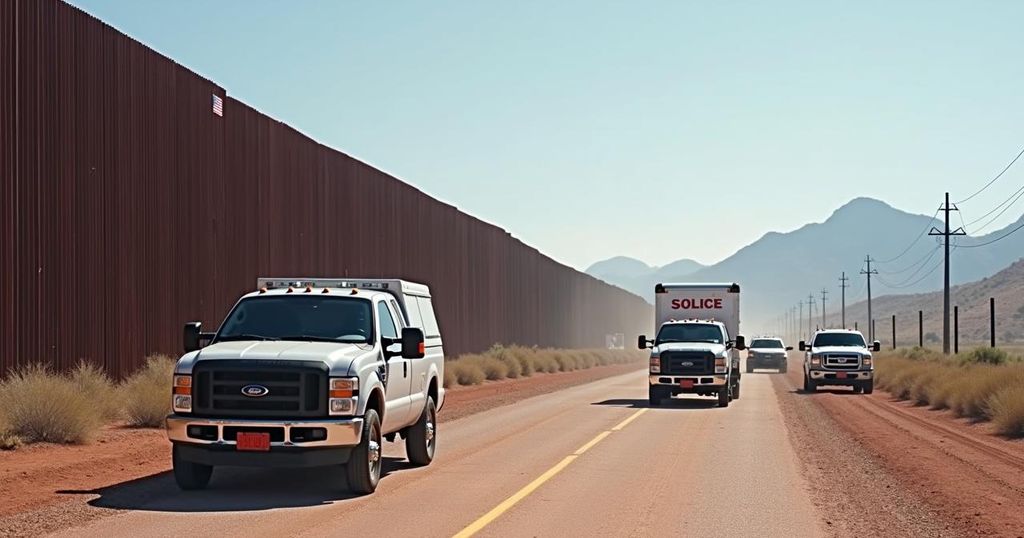Mexico Intensifies Border Enforcement ahead of U.S. Elections, Influencing Migrant Flow
As the U.S. election nears, Mexico has enhanced its border enforcement, resulting in a drastic reduction in migrant crossings, thanks to an informal agreement with the Biden administration. This strategy is politically motivated, aiming to stabilize both countries’ interests ahead of the elections, even as it raises concerns regarding humanitarian impacts.
As the U.S. election approaches, Mexico has intensified its enforcement of migrant crossings, resulting in a notable decline in the number of migrants reaching the U.S. border. Analysts attribute this significant reduction in illegal crossings to an informal agreement between the U.S. and Mexico, established under the Biden-Harris administration. This accord is strategically beneficial for Mexico as it seeks to maintain economic stability in the face of potential border chaos that could affect its exports to the United States. In the context of the upcoming presidential election, immigration remains a critical issue, particularly for Vice President Kamala Harris, whose electoral prospects could be jeopardized should Mexico ease its border enforcement. Former Mexican ambassador to the U.S., Arturo Sarukhán, highlights President Claudia Sheinbaum’s awareness of Mexico’s influential role in U.S. electoral dynamics. The impact of Mexico’s enhanced border policies is evidenced by a dramatic fall in migrant encounters at the U.S. border, from nearly 250,000 in December to below 60,000 recently, marking the lowest figures since the Trump administration. Meanwhile, Mexico’s immigration agencies have reported an increased number of migrant encounters within its own territory, indicating a shift in enforcement tactics. Migrants such as Mari Eduvid Sarmiento and her family exemplify the arduous journeys faced by those attempting to reach the U.S. border. They have encountered heightened restrictions and enforcement, ultimately finding themselves stranded in Mexico City after attempting to evade immigration authorities. The cooperation between the U.S. and Mexico on migration issues intensified following urgent negotiations initiated by President Biden late last year, during which the U.S. threatened to impose trade restrictions to compel Mexico to heighten its border security measures. This pressure has resulted in Mexico employing strategies such as increasing visa requirements for certain nationalities and utilizing a system designed to prevent migrants from successfully progressing northward. With the ongoing increase in immigration enforcement within Mexico, questions arise regarding the sustainability of these policies and their alignment with Mexico’s legal obligations to protect migrants. The balance between economic interests and humanitarian responsibility remains a contentious point in U.S.-Mexico relations as the election draws closer.
The significant reduction in migrant crossings at the U.S.-Mexico border can be largely attributed to Mexico’s ramped-up border enforcement. This enforcement is rooted in an informal agreement between the United States and Mexico, instigated by the Biden administration amid escalating migration challenges that could adversely affect political outcomes in the U.S. With immigration remaining a focal point in the forthcoming U.S. elections, Mexico’s cooperation becomes crucial in minimizing migrant flows that could furnish political ammunition for opposition candidates. Historically, the U.S. has faced surging numbers of migrants from various regions, leading to humanitarian crises at border cities and overwhelming local resources. The recent tactics implemented by Mexico underscore a shift towards stricter migration policies, despite the humanitarian implications that may ensue. The evolving dynamics of this bilateral relationship amid a politically charged environment will be pivotal in shaping the outcomes of both countries’ immigration policies.
In conclusion, Mexico’s proactive approach to border enforcement has resulted in a significant decrease in migrant crossings into the United States, driven by both economic imperatives and the looming U.S. presidential election. As Mexico faces pressures to maintain border security while mitigating the humanitarian implications for migrants, the informal agreements with the U.S. illustrate the contentious interplay of political strategy and migration management. The upcoming elections may further influence how Mexico navigates its role in this complex bilateral relationship, making the situation one to watch closely.
Original Source: www.usatoday.com




Post Comment